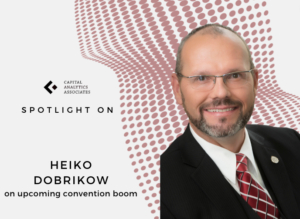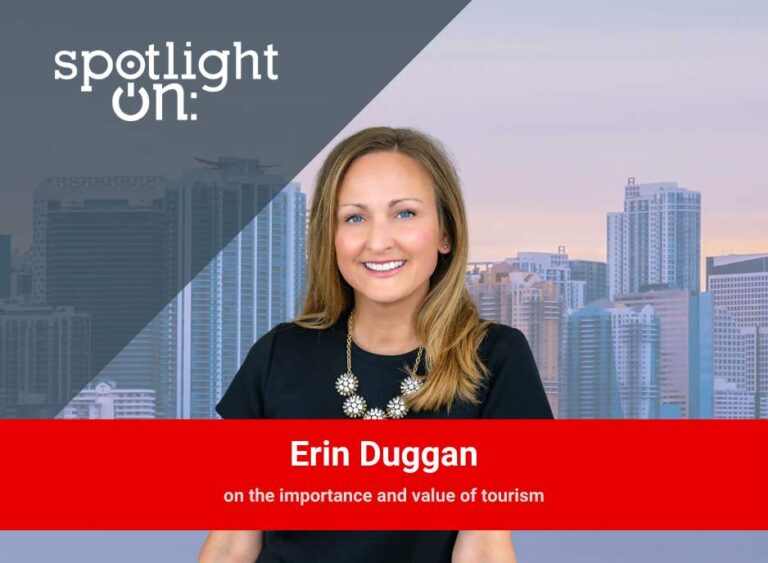Spotlight On: Heiko Dobrikow, Executive Vice President & General Manager, Riverside Hotel
 July 2023 — In an interview with Invest: Heiko Dobrikow, executive vice president and general manager of Riverside Hotel, talked about the remarkable growth of the tourism industry within the region, the protracted workforce housing dilemma and labor shortage, and the services they offer which help to distinguish them from other hotels in the region.
July 2023 — In an interview with Invest: Heiko Dobrikow, executive vice president and general manager of Riverside Hotel, talked about the remarkable growth of the tourism industry within the region, the protracted workforce housing dilemma and labor shortage, and the services they offer which help to distinguish them from other hotels in the region.
What have been some major highlights over the last year for Riverside Hotel?
2022 was a remarkable year for our company and hotel, with record revenues and profits. Despite the compression in the leisure business, we successfully maintained our occupancy while raising our average rates by nearly 17%. This achievement was possible because we believe in our product and the prime location of our hotel on Las Olas Boulevard, with its blocks of retail, dining and entertainment options.
Although the market is cooling off, our transient leisure customer segment remains strong. We have also experienced a notable increase of about 20% in our group business compared to the previous year. However, business travel customers have been slower to return, and we have seen only a steady uptick in that segment.
Looking ahead, we anticipate that business transient will be the last segment to fully recover. Group business has shown signs of returning, although most commitments are currently short-term, likely due to the lingering effects of the pandemic. Lastly, we find that multi-year contracts are less common at the moment.
Have the preferences or priorities of your customer base evolved in any way, and if so, how are you adapting to cater to these changes?
In terms of our market strategy, there haven’t been significant changes. The Southeast region remains our strongest market, particularly Florida due to its proximity. However, the recovery of international business has been slower than expected, with domestic travelers dominating our customer base. Consequently, we have maintained our marketing focus on the Southeast region, with some additional attention to feeder markets connected to the Fort Lauderdale International Airport, especially as it has experienced an impressive uptick in international travelers. Compared to the previous year, there has been a doubling of international passengers, reaching approximately 2.1 million for the first quarter. In fact, the airport’s total customer increase in the first quarter alone was 9.3 million, reflecting a remarkable 29% growth, which is also thanks to the expansion work being done on the Fifth Terminal as well.
We are also delighted to report continued growth in the cruise business, with a remarkable 114% increase. In the first quarter, the cruise port welcomed around 1.3 million passengers, almost reaching the levels of 2019. This positive trend has contributed to our hotel’s occupancy and overall recovery to pre-pandemic levels.
Looking ahead, as the Convention Center resumes operations, we are seeing increased convention business in the 17th Street sector, which is now causing some compression in the downtown district. While the current groups are not yet large enough to generate city-wide conferences, the forthcoming construction of the 800-room Omni Hotel is expected to bring significant changes to the marketplace by 2025 and 2026. We anticipate around 20 citywide conferences that will drive compression in the market, and we are prepared to capitalize on these opportunities in the future.
How are you working to offer a food and beverage proposal that is in tune with what the market offers in terms of quality, diversity and guest expectation?
We continue to experience seasonality, and this summer we anticipate returning to a more typical season after the exceptional last two summers. The compression we witnessed during the previous summers, where leisure customers flocked to Florida as a preferred travel destination, is not expected to repeat itself as other locations open up. Consequently, we anticipate distinct winter and summer seasons.
Given our long-standing presence in the market since 1936, our primary focus remains on our local customers. We price our restaurants, including Wild Sea Las Olas, The Boathouse, and the recently opened New River Cafe and Bakery, in accordance with local purchasing parity. While guests may be surprised by our affordable menu prices, we pride ourselves on delivering extraordinary food quality.
It is no coincidence that all of our restaurants have consistently ranked among the top 20 on TripAdvisor, which is partly because we continue to offer fresh, made-from-scratch food as we understand that’s what today’s travelers seek. Thus, our restaurants provide reasonably priced options that don’t strain the wallet, which explains the high volume of patrons we attract whether they are local or visitors. Our commitment to fair pricing has played a significant role in differentiating us from our competitors.
Furthermore, the past 12 months have presented challenges in maintaining our low pricing due to supply chain issues. The fluctuating prices made it difficult, but our team worked diligently to secure competitive product pricing through various channels and suppliers. This effort allowed us to navigate the supply chain obstacles and maintain our commitment to affordability.
What challenges are you currently facing within the market?
The labor market is extremely tight, presenting a significant challenge for our industry. The unemployment rate has been around 2%, resulting in a labor deficit of 40%. In April 2023 alone, there were 24,000 job seekers in Broward County, but 41,000 jobs were posted, leading to a deficit of 40%. Thus, creating a workforce housing market that provides a high quality of life for everyone is crucial. However, housing prices are escalating, posing a barrier to achieving this goal. And so, businesses are adapting and leveraging technology to address the labor shortage.
To address the unemployment situation, we have developed a heat map that shows the distribution of unemployed individuals by zip code. This allows us to target marketing efforts toward areas with higher unemployment rates, such as the 33311 zip code. We recently organized a successful job fair in that zip code, resulting in several interviews lined up.
We are also working with schools to provide assistance in the medical and health service fields, as these occupations show significant growth potential. The Visit Lauderdale Dashboard provides valuable insights into the hospitality industry, including upcoming developments, such as 44 new properties with 6,583 guest rooms in the pipeline within the next three years. That’s tremendous growth, but where are we going to get all the workers to fill all of these positions when we don’t have housing for them? Greater Fort Lauderdale is going to be in an interesting conundrum in the years to come.
The hospitality industry in Greater Fort Lauderdale has experienced positive trends, as indicated by increasing tourism tax collections and airport passenger numbers. However, there has been a slight cool-off in visitor numbers in April. Restaurants in Fort Lauderdale have shown an uptrend in volume, while vacation rentals (Airbnbs and VRBOs) have experienced a decline.
What is your outlook for the next few years, and how does that inform your priorities?
For our hotel, we’re going to take this time to get back to normalcy. As we’re seeing that we are cooling off a little bit, it’s now the time to do capital investment, and undertake full room renovation and other improvements so that we can offer products by 2025 that can compete with other hotels that are in the marketplace, especially the upcoming Convention Center Hotel. So strategically, I would think that many hotels will probably follow suit in a similar fashion.
We believe that the group market will continue growing. I think our market mix will eventually get to about 20% or 25% group market once this Omni hotel has been built, and the convention center expansion has been completed. The Fort Lauderdale International Airport expansion will be the catalyst for us to have the confidence that the passengership for that airport will escalate from mid-30 million annually to hopefully over 40 million a year. When you take a look at the increase of customers coming into the marketplace, you will see that the leisure customer, the business transient customer, and the group customer will come back in the marketplace. I know that people will fly into FLL and will probably stay in Miami or Palm Beach because it is a low-cost carrier airport. It is very lucrative, and that’s how we niche ourselves. And of course, international travelers, for the most part, come out of the Miami International Airport. I just talked to a family from Latin America last week, and they flew into MIA and they drove up here in order to stay at our hotel and enjoy Las Olas Boulevard.
2024 is an election year, and election years are a disruptor for consumer confidence. When you take a look at the Democratic and Republican sides still being very polarized, I think the political climate in this country will remain unstable, and folks may put the brakes on next year a little bit in terms of what they may want to do. We have been looming with a recession, and I feel we have not gone into a recession yet. However, the big challenge that the federal government has is continuing to create debt, which for the citizens of this country is a very concerning point.
Florida is undeniably the travel and tourist capital of the United States, and it will continue to hold that position for decades to come. However, we must also acknowledge the imminent threats that we face. One of the key challenges is the housing market, which demands that we become smarter and more tech-savvy in our approaches.
The workforce housing dilemma is an issue that cannot be resolved overnight. To address the current shortage of 54,000 housing units, it will take at least a decade of dedicated efforts. However, over the next five years, we have a plan to construct approximately 22,000 units. This progress is made possible by the availability of funds specifically allocated for affordable housing. The Sadowski fund, which was previously at risk of being diverted, is now protected. Governor DeSantis has ensured that the money invested in the affordable housing fund remains within our community, enabling us to build affordable and workforce housing units.
For more information, visit:













